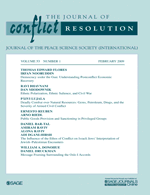Why do some armed civil conflicts last longer than others? Drawing on a contest success function model, we show that geographic factors (such as location, terrain, and natural resources) interact with rebel fighting capacity and together play a crucial role in determining the duration of conflict.
Using precisely dated duration data in event history models and geographic data for the conflict location, we find that conflicts located at considerable distance from the main government stronghold, along remote international borders and in regions with valuable minerals last substantially longer. In addition, we find that rebel military capacity in its own right increases the prospects of a civil conflict ending within a short time period. Our findings imply that the distances an army must travel to project power, rebel fighting capacity, and characteristics of conflict region affect how a civil war is fought and who will prevail.









